Can Your Kitchen Sponge Make You Sick? This and Other Germy Questions Answered
by www.SixWise.com
By now most people know that to live on earth is to coexist with an endless variety of microbes. Bacteria, viruses and other invisible invaders coat our kitchen counters, our toothbrushes, our offices and even our own hands.
|
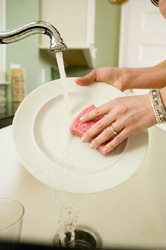
Sponges usually contain 10,000,000 or more fecal bacteria, which can get spread onto anything the sponge touches!
|
Americans actually touch about 300 different surfaces every 30 minutes, so it’s inevitable that we’re going to come into contact with germs each and every day … but not all of them are anything to worry about. Here we discuss some common areas you’re likely to come into contact with every day, and whether or not they harbor germs that can make you sick.
Your Kitchen Sponge
The sponge that you use to wash dishes and clean your counters has been called the most germ-laden object in the household. According to Charles Gerba, a professor of microbiology at the University of Arizona:
“They [Sponges] usually contain 10,000,000 or more fecal bacteria. In a study we did some years ago, we found salmonella in 10 percent of them. The reason is that they are wet and pick up food for the bacteria. They do a great job of spreading bacteria around the household."
The solution? Well, you can wet the sponge and put it in the microwave, which has been shown to kill off some germs. But it will still pick up more the next time you use it, and then spread them around whatever you try to wipe off.
"There's a reason why the model food code doesn't permit restaurants to use sponges where food is prepared ... The code recommends the use of wiping cloths, which are easier to keep clean than sponges," says Bessie Berry of the U.S. Department of Agriculture's Meat and Poultry Hotline.
Instead of sponges and typical rags, SixWise.com very strongly recommends PerfectClean Terry Cloths. These cloths are made of the 100 percent safe Hosptial-Grade Ultramicrofibers that are only 3 microns in size, which is even smaller than many bacteria. Far more effectively and safely than any other type of cleaning tool out there (which is why they are used in hospitals), they pick up anything in their path, down to those contaminants that cannot be seen with the naked eye.
And unlike the old common types of rags that simply spread microscopic contaminants around when you wipe with them, PerfectClean Terry Cloths hold fast to everything they pick up! Plus, they can be used well over 100 times before being replaced, so they're much more economical than sponges and other wipers, which should be replaced often.
A much better, and more economical, solution is to replace your kitchen sponge with PerfectClean cloths.
Unlike sponges that simply push dirt around, PerfectClean's revolutionary Hospital-Grade Ultramicrofiber construction enables them to reach deep into microscopic crevices (NO other cleaning tool available even comes close!) and remove everything in their path, including biological contaminants too small to see with the naked eye.
|
PerfectClean Cloths:
Don't Leave Home Without Them
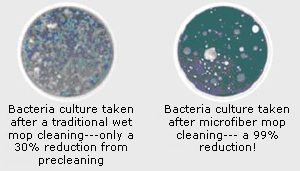
The PerfectClean OfficePure Pack is an essential tool for keeping germs at bay. The cloths are made with a revolutionary ultramicrofiber construction that enables them to reach deep into microscopic crevices (NO other cleaning tool available even comes close!) to actually remove dirt and bacteria, not just push it around like ordinary cleaning rags.
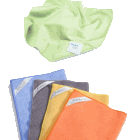 Plus, these cloths are small enough to slip into your pocket, purse, or desk drawer, and you can use them without any cleaning products or water. Simply pull out the cloth, wipe down any number of surfaces, and enjoy the peace of mind in knowing your home and office are truly clean. Plus, these cloths are small enough to slip into your pocket, purse, or desk drawer, and you can use them without any cleaning products or water. Simply pull out the cloth, wipe down any number of surfaces, and enjoy the peace of mind in knowing your home and office are truly clean.
Learn more and order your PerfectClean OfficePure Pack now!
|
A Toilet Seat
Ironically, studies consistently find that toilet seats have lower levels of bacteria than many other surfaces. In fact, experts agree that even sitting on a public toilet seat is unlikely to give you any type of infection or disease.
"Just sort of sitting on the seat and having that contact with the skin on your butt isn't going to be a way of transmitting an infection," said Elizabeth Scott, co-director and founder of the Simmons Center for Hygiene and Health in Home and Community Settings at Simmons College in Boston, in an ABC News article.
Your Desk and Phone
You sit there all day, likely completely unaware that your desk may hold 400 times more bacteria than the average toilet seat, according to a three-month study funded by The Clorox Company. And telephones? They had the highest level of germs found during the study.
"For bacteria, a desk is really a laptop of luxury," Gerba says. "They can feast all day from breakfast to lunch and even dinner."
"We don't think twice about eating at our desks, even though the average desk has 100 times more bacteria than a kitchen table and 400 times more bacteria than the average toilet," says Gerba. "Without cleaning, a small area on your desk or phone can sustain millions of bacteria that could potentially cause illness."
|
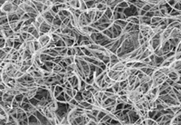
PerfectClean Ultramicrofibers, at just 3 microns, are even smaller than many bacteria! Wet or dry, the cloths pick up everything in their path!
|
The solution for this one is easy. Pick up a PerfectClean OfficePure Pack, which has everything you need to sanitize your office in a snap. Simply use the cloths to wipe down your phone, desk and other office surfaces often, at least once a day, and more frequently during flu season or if others use your office equipment regularly.
Air Hand Driers in Public Restrooms
There has long been speculation that air blowers are unsanitary because they spread germs around so you may breathe them in. Is this true?
"That is certainly a myth, because we have done our own studies in that regard," said Syed Sattar, a professor emeritus of microbiology at the University of Ottawa, in an ABC News article.
While the driers do not pose a risk in terms of an increase in bacteria in the air surrounding them, Sattar pointed out that the buttons used to start them likely will accumulate bacteria. Ideally, look for the versions that start automatically without your having to touch anything.
|
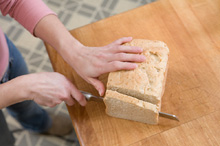
Cutting boards with deep grooves are most likely to harbor bacteria.
|
Cutting Boards
Whether plastic or wood, Gerba says that the average household cutting board has 200 times more fecal bacteria than a toilet seat. The worst offenders are those that have deep grooves in them from cutting, as they are the perfect places for bacteria to flourish.
Ideally you should disinfect your cutting boards regularly using bleach or by running them through the dishwasher, and even then replace them often. Experts also recommend having two cutting boards just to be safe, using one for raw meats and the other for vegetables.
Shopping Cart Handles
As you’re pushing your shopping cart through the grocery store, you likely don’t realize that your hands are clasped around one of the worst public places in terms of germs.
According to University of Arizona researchers, shopping carts contained more saliva, bacteria and fecal matter than escalators, public telephones, and even public restrooms. To protect yourself and your family, wipe down the handle with a PerfectClean cloth before using, and wipe your hands down with one after you leave the store. Then, after you return home wash your hands well (a good habit to get into anytime you return home).
Recommended Reading
The Surprising 9 Jobs With the Highest Germ Exposure -- and What You Can do About It
Computer Keyboard Germs: Your Fingers aren't the Only Things Dancing All Over Your Computer Keyboard
Sources
ABC News December 29, 2008
ABC News February 8, 2007
ABC February 17, 2006